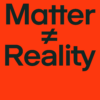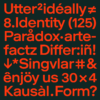A resolute typeface with a sober appeal
Solid is a work-in-progress typeface used as a productive tool in many of our projects. It is an aim at uniting the seemingly natural proportions of 20th-century neo-grotesques with a firm, geometric construction informed by strict arithmetics, drawing reference to contemporary typefaces such as Riforma. Coming with refined ligatures and several stylistic sets of alternate glyphs, it includes straight and curved tails as well as square and rounded punctuation. While maintaining a confident and sincere presence, Solid flexibly adapts to different contexts.



